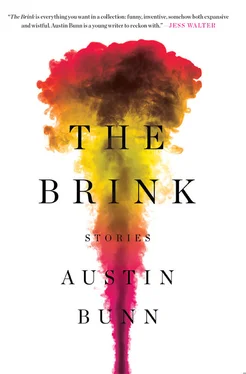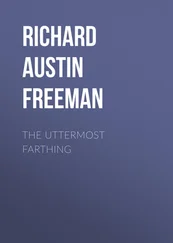At the end, Sam improvises a bowl with his shirt and Ethan plucks five red chips from it. This makes sense for a moment, since Ethan can’t reach the floor. But that leaves Sam stuck with the remaining colors.
“Don’t you want to trade?” Sam asks. “Aren’t we supposed to?”
“No, not really,” Ethan says.
The professor whistles again. The game is over. Ethan drives his wheelchair to the front of the room, where the professor counts the chips and Ethan, with the five red chips Sam gathered for him, ends up the winner. “Congratulations, you get to choose your country,” the professor says, and Ethan flashes the headlights on his wheelchair, basking in praise. He doesn’t even look at Sam, who feels lied to, or at least not told everything other people know. Like two weeks ago when Mom dropped him off at the video arcade with a twenty-dollar bill, and he came home with most of it unspent, feeling thrifty and proud, only to find the front door locked and a strange jeep parked out front. He knocked until she answered in the silky gown she only wore at night and her hair all crazy, and she said, like she was sad to see him, “Oh, Sam, please, help me out here.”
Sam needs lessons in people.
At the afternoon pickup, his father asks, “Who blew up who?” Kids stream out of the hall into the waiting cars. Sam slumps into the passenger seat of his father’s truck and watches as an elevator hoists Ethan into a van driven by his mother. His father feeds in a Beach Boys tape in a preemptive bid for affection. It’s the one tape Sam said he liked. On the dash sits a twisted up bag of peanut M&Ms, opened already and therefore tainted, the ransom for spending another weekend with his father.
“Okay then,” his dad says to the silence. “What do you want for dinner?”
“Pizza.”
On his old bed, in the house in the woods, Sam pours over the class textbook, a catalog of ballistic missiles — their ranges, payloads, blast perimeters. He reads about the Centaur, a missile that scissors the clouds and guides itself by the stars. It’s more powerful, more beautiful, that way: a missile that looks up. Now he has a favorite missile. He wonders what the stars will see the day the war begins, the whole planet brightening, then going gray like a dead bulb.
Sam cinches a piece of floss around his two front teeth, to close the gap between them. He wants to teach them to get in line, and the dull ache in his gums is the proof that they are learning. The sounds of the television rise up through the floor. Downstairs, in the dark, his father watches sports with the unsalted, least-fun peanuts. The house is dim and cavernous now, since they left. Mom was the one who kept on the lights, and his father would follow behind, turning them off.
Earlier, in the garage, his father showed off the car engine he had taken apart, the grimy pieces laid out on newspaper like bones from a dig. The front grille of the VW van, the one his father uses for his house-painting company, gaped in front of them, a face with a staggered aspect. His father pointed out the ways the pieces came together, the Wite-Out dashes he’d made to remind him how they joined.
Sam thought: my father will be useful in the afterscape.
He sets the book down and stares out his bedroom window. The night is clear and the trees behind the house almost purple. A plywood plank covers the old well, now just a ring of crumbled stones. Sam can make out, nestled up in the crook of the maple tree, the tree house his father built for him. If necessary, Sam can raise the rope ladder and survive up there. His fingers trace the fire emergency decal on the windowpane, the one they passed out in school. “KID INSIDE,” it says. No one will notice this sticker in the war, Sam thinks. No one will be looking for stickers.
“Sambo,” his father says at the door, beer in hand. “What’s happening?”
Sam tells him about the arcing paths of Centaurs and Tridents, twenty times more powerful than Hiroshima.
“Jesus Christ,” his father says. “That’s what they’re teaching you?”
“That’s the homework.”
The next morning, his father comes with him to class. Having your parents, the Big Robots, come with you is a sign of weakness. Sam separates himself as much as possible, trying to look like he barely recognizes the man who tinfoiled the leftover pizza for lunch and who quizzed him on the state capitals on the drive.
Ethan motors over. He’s dressed in the same shirt and pants from yesterday, only different colors. His Panama hat dangles from one of the handles of his chair.
“Is that your father?” he asks.
“Maybe,” Sam says. He watches his father shake hands with the professor and point Sam out. The professor’s beard is bigger than his father’s, and Sam theorizes that he has unknown capacities, subterranean holds of grown-up.
His father waves him over, and Sam drags himself to the professor’s side. “If anything we do in class makes you feel uncomfortable, you can opt out, right?” he says.
This close, Sam notices a gap between the professor’s front teeth, just like his own, and he feels a sudden, covert allegiance.
“I’m fine,” Sam says.
“Good,” his father says. “As long as it’s on the up and up.” He holds out his palm. “High-five.”
But if Sam high-fives, in front of the class, the gesture will cost him. Enjoying the company of your parents is a form of offsides. His father pats him on his shoulder instead, swipes his bangs out of his eyes. “Be good,” he says. “And tell your mom you need a haircut.”
The class unfolds a world map, the size and wrinkled texture of Twister. Last class, they chose their countries. As the winner, Ethan took the U.S.A., large country/large resources, and became the most hated person in the room. Out of spite and boredom, Sam chose an island, a speck in the Pacific. Guam.
“You can’t sit this one out,” the professor said to him. “Look at the Falklands. Look at Cuba.”
“I’m looking at Cuba,” Sam said. “Now what?”
“Little places have a way of changing history.” This is the professor’s way of making Sam feel better, except stories like this only make him sick to his stomach. He doesn’t want to change history, just outlive it.
The professor circles the room, handing out army men and single matchsticks to represent missiles. “First we’ll see who survives,” the professor says. “Then we’ll find out how to survive.”
Ethan gets a whole matchbox and an entire freezer bag of army men. The map fills up with their allotments. Sam takes his single army man, a grenade thrower, and bends the arm around so it picks its butt. He hears the whirr of Ethan’s approach.
“Take these,” Ethan says. He hands over several army men and a single matchstick. Sam can see the underside of Ethan’s chin, where a razor has been. He’s old enough to shave.
“What for?” Sam says.
Ethan blinks. “Because you’re mine. Guam is pretty much America. Look it up.”
Over lunch, Sam befriends the Pacific Rim: Jerusha from Weehawken and Irwin, the Asian kid from West Orange. They eat at a picnic bench outside the hall, under an old oak. The branches are so low that wooden support beams prop them up and the twins kick at them, trying to dislodge them, anything to do damage. Irwin puts his retainer on a leaf. Jerusha’s parents wanted her to be at Christian camp, she says, but she thought she’d be “more useful” here. She tells Sam that the leftover pizza he’s eating is two percent rat droppings and that she saw an angel over her house once.
“How did you know it was an angel and not an alien?” Sam asks.
Jerusha looks stricken. “Because he smiled.”
Irwin pounds the picnic table. “That is not proof of anything!”
Читать дальше











